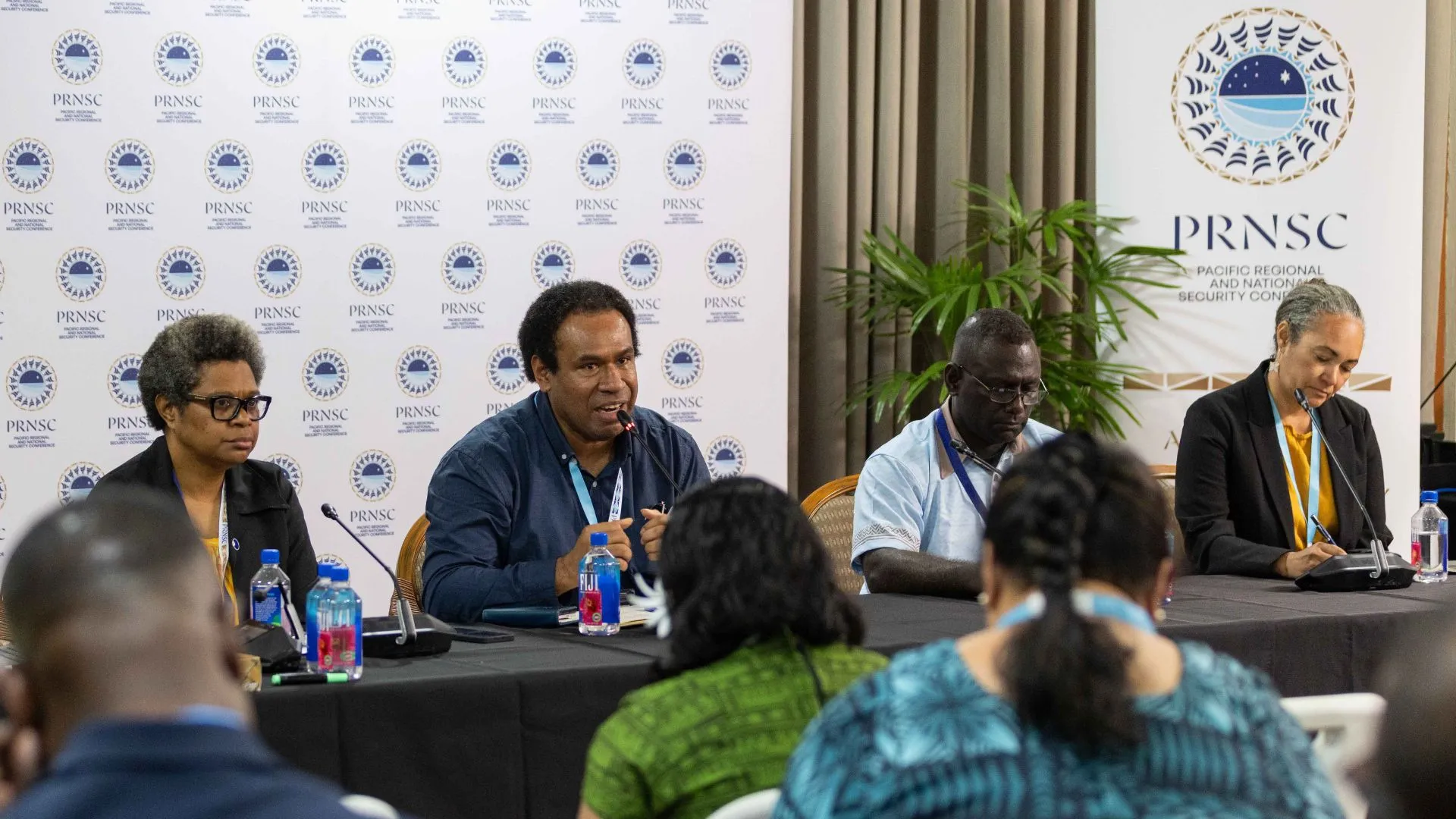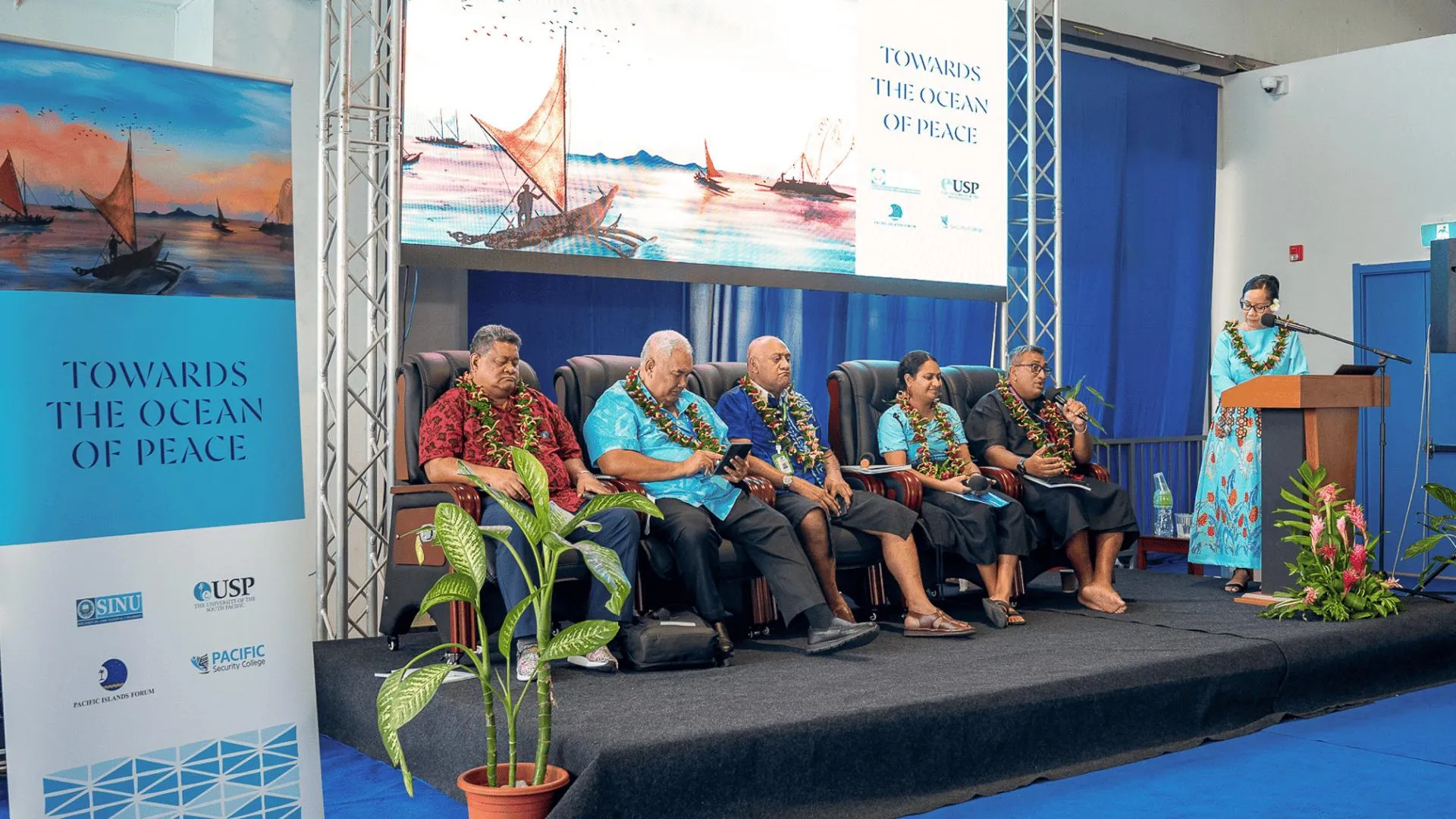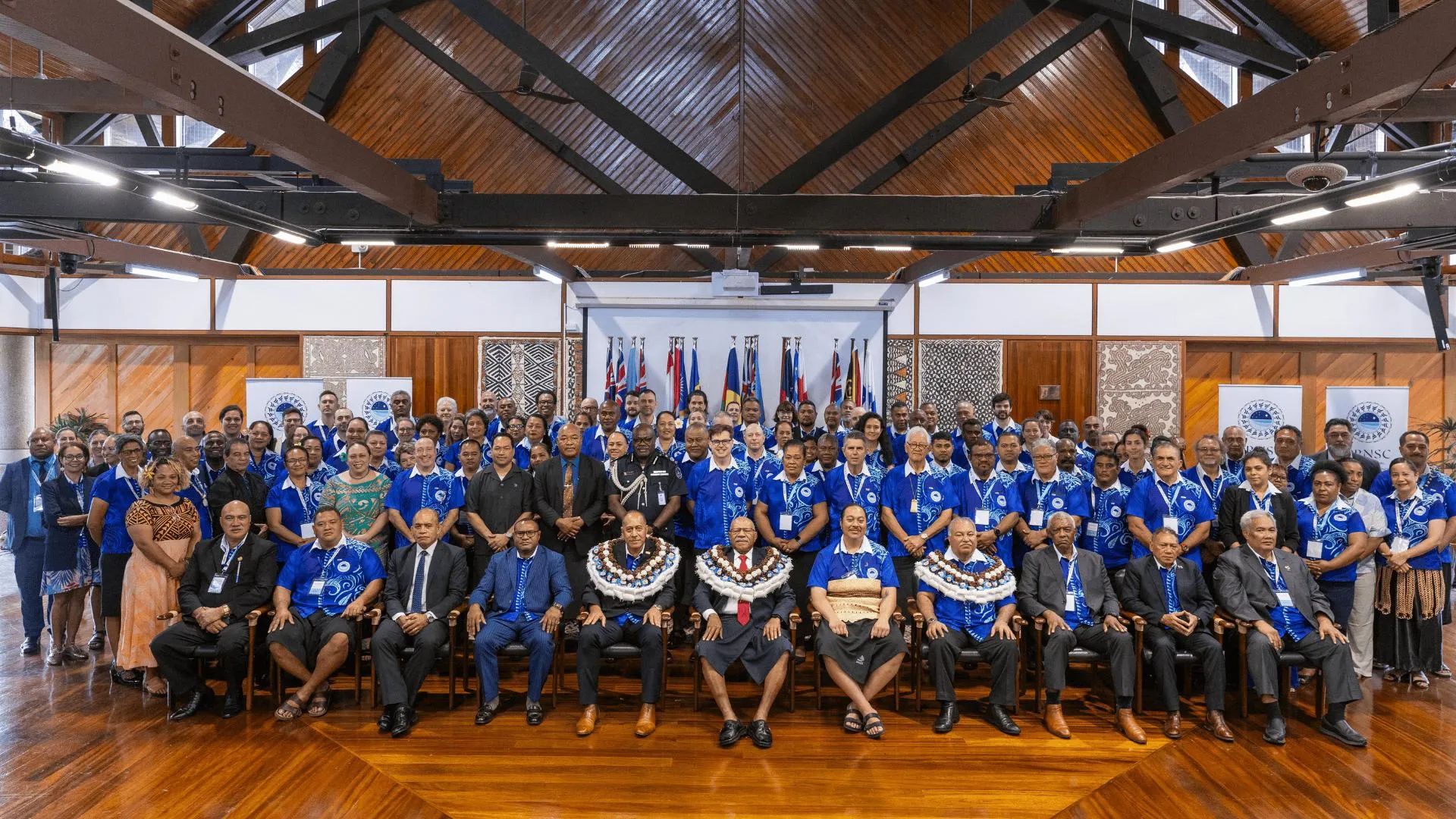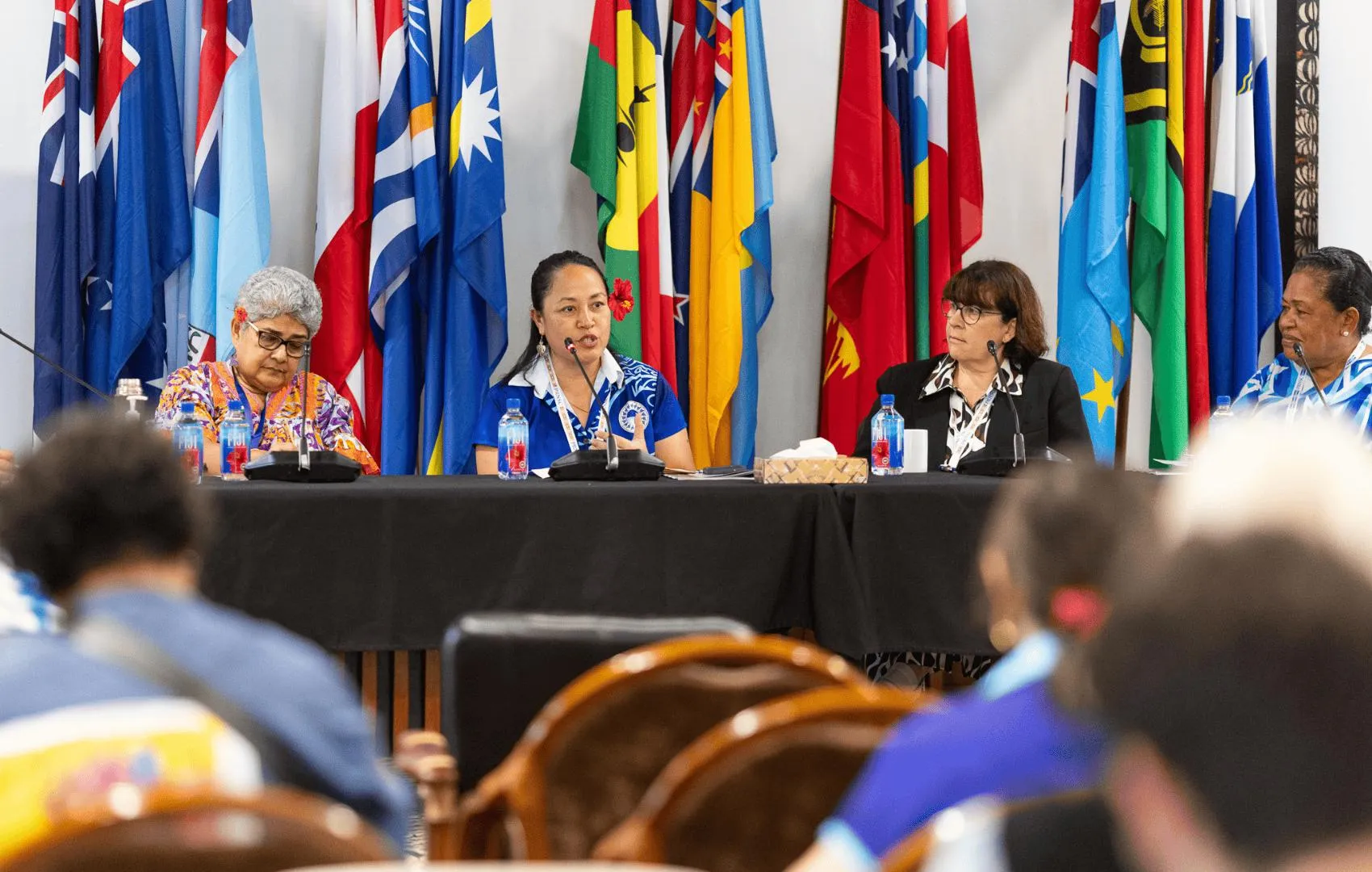Boe Declaration and beyond: rethinking Pacific security through culture, climate, gender and rights

The Boe Declaration and Beyond panel at the Pacific Regional and National Security Conference
As Pacific leaders, policymakers and regional experts convened in Suva this week to address some of the region’s most complex and converging security challenges, the Boe Declaration and Beyond panel provided a timely and strategic reassessment of the Pacific’s evolving security agenda, grounded in shared values and collective action.
Framed against the backdrop of climate threats, geopolitical shifts and rising social inequalities, the discussion reflected deepening calls for an updated, Pacific-owned action plan firmly grounded in regional values and aligned with the 2050 Strategy for the Blue Pacific Continent.
The session convened four prominent Pacific voices: Dr Fiona Hukula of the Pacific Islands Forum Secretariat (PiFs), Senior Sergeant Peter Ririvere of the Royal Solomon Islands Police Force, Pacific legal expert Romulo Nayacalevu, and PhD scholar Anna Naupa from the Australian National University.
The panel reflected on how the Boe Declaration’s security framework could be strengthened to better reflect regional realities, especially the intersection of gender, culture, human rights and environmental challenges.
Dr Fiona Hukula emphasised the need to move beyond the tokenistic inclusion of women in security frameworks. “There’s opportunity now with the new action plan to ensure that there’s a wider range of consultation around the role of women, not just in the security forces, but women as analysts, peacemakers, and community leaders,” she said.
Dr Hukula called for inclusive engagement that spans across government, academia, climate sectors and non-traditional spaces, ensuring women’s voices, especially from marginalised groups, are not left behind.
“When we’re talking about the Boe Declaration and all the work that we do at the Secretariat around social gender and social inclusion, we need to make sure we’re talking about women, peace and security, and also ensuring that children, vulnerable groups, persons with disability … are not an afterthought. How do we work better together to ensure the priorities of our members are being met and elevated at the regional level?”
This call for inclusivity was echoed by Romulo Nayacalevu, who rejected the notion that human rights are foreign to the Pacific. Drawing on his doctoral research and extensive regional legal experience, he argued that human rights are inherently Pacific, rooted in customary values of dignity, fairness and respect.
“Human rights are not just a Western issue … the Tongan 1875 Constitution enshrined a bill of rights even before the Universal Declaration of Human Rights of 1948,” he said. “When we respect our elders, women, and children, we are already practicing these principles. We just never called it ‘human rights’.”
To strengthen the region’s accountability and governance systems, he proposed the creation of a Pacific Charter or Treaty on Human Rights, grounded in regional values but aligned with international frameworks.
That interplay between international obligations and local realities was further illustrated by Senior Sergeant Peter Ririvere, who highlighted a pressing yet often overlooked threat, unexploded ordnance (UXO) from World War II.
“We typically remove between 60 to 100 items each week … this process is reactive and often occurs only when the land is cleared or construction begins,” he said. “The risk to the civilian population, especially children, is significant.”
Senior Sergeant Ririvere called for deeper cooperation across the Pacific, including donor support, regional maritime security partnerships, and better resourcing of local clearance teams. He argued that UXO remediation should be woven into broader environmental security and ocean conservation frameworks.
For Anna Naupa, the intertwined security threats of gender inequality, climate change and lingering colonial legacies point to the need for cultural security to be recognised as central to any regional peace strategy. “We’re not defending culture with guns. We’re defending a way of life with our actions, words, and intergenerational continuity,” she said.
Cultural security, she explained, includes traditional knowledge, customary land tenure, governance systems, and Pacific peoples’ sacred relationship with place.
“The conversation we’re not having is around customary land tenure. It is fundamental to our cultural continuity and existence,” she said. Ms Naupa warned that new concepts like the ‘Ocean of Peace’ should not dilute or distract from long-standing commitments under the Boe Declaration.
The discussion then returned to legal mechanisms as a means of bolstering commitment. Mr Nayacalevu advocated for converting the Boe Declaration from a non-binding aspiration to a legally enforceable regional treaty.
“Declarations are statements of intent … but to address sophisticated issues like transnational crime, gender-based violence and climate displacement, we need enforceable standards,” he said.
He pointed to the Melanesian Spearhead Group (MSG), where leaders have signed regional treaties on culture, family protection, and judicial cooperation, demonstrating that the Pacific can create and uphold its regulatory frameworks.
MSG Acting Director-General Ilan Kiloe, attending as a delegate at the conference, reinforced this view, offering insight into how MSG is aligning with and extending the Boe Declaration.
“We have a Treaty on Traditional Knowledge and a dedicated security strategy for Melanesia. We are also exploring the link between climate change and conflict through partnerships with Queensland University,” he said.
He added that the subregional bloc is focused on integrating climate-security responses into its unique Melanesian context, demonstrating how tailored, localised strategies can strengthen wider Pacific frameworks.
Moderator Joel Nilon, Senior Pacific Fellow at the Pacific Security College, reminded participants of the real task ahead: “We must strengthen, not distract from the Boe Declaration. Align it with the 2050 Strategy for the Blue Pacific Continent, and ensure it reflects our systems, our people, and our priorities.”
About the Pacific Regional and National Security Conference
Set against the backdrop of the Boe Declaration on Regional Security and the 2050 Strategy for the Blue Pacific Continent, the Pacific Regional National Security Conference (PRNSC) is one of the region’s largest gatherings of the national security community from across Forum Island Countries. Presented by 11 organisations, including the Pacific Security College, the conference provides expert updates and insights on key security issues outlined in the Boe Declaration, including climate change, human security, transnational crime and cybercrime.


